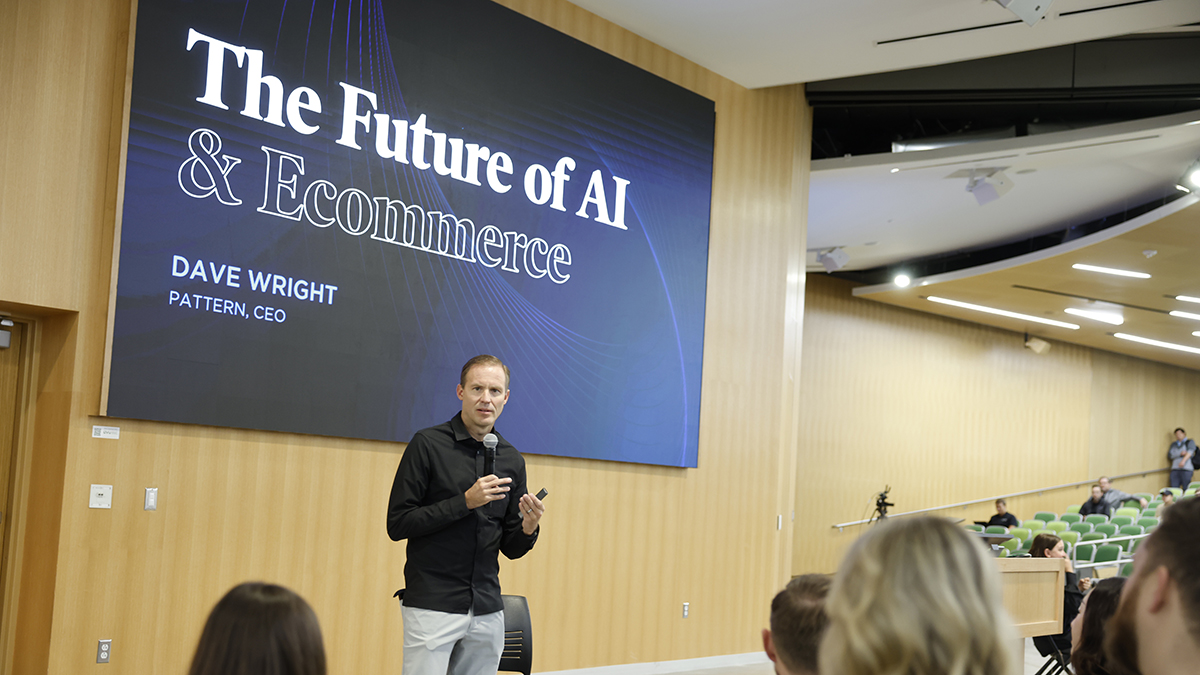Artificial intelligence can be a great force for good; it also has the potential to create chaos and destruction. That was today's overriding message at the inaugural Silicon Slopes Artificial Intelligence (AI) Summit hosted by Utah Valley University.

Artificial intelligence can be a great force for good; it also has the potential to create chaos and destruction. That was today's overriding message at the inaugural Silicon Slopes Artificial Intelligence (AI) Summit hosted by Utah Valley University.
“There is limitless growth potential with artificial intelligence,” said Tyler Folkman, chief technology officer and AI officer for Benlabs, where his team explores applications for machine learning in disrupting and transforming creator entertainment. Folkman was among the AI experts who spoke at the conference.
“We don’t know how good this can get,” Folkman said. “There’s a lot of belief that it can get really good, and there’s a lot of fear about that, but as we keep making it better, it has limitless possibilities to help us. You could say it has limitless possibility to hurt us, but I think that is now within our control to figure out.”
Utah Attorney General Sean Reyes called for involvement from the tech industry to create policies and laws. “We need you — you who are experts, you who are consumers of AI — to make sure that the laws and policies passed protect humanity but don’t destroy the positive applications of AI,” Reyes said.
Reyes added that tools are already available, with more in the works. “There are some compelling protections that have been proposed, things like digital watermarks or inherent ID markers that allow a consumer, a business, or a judge to know when something is fake or real,” he said.
Rachel Bi, an associate professor in UVU’s Personal Financial Planning Program and head of the Finance and Economics Department at the Woodbury School of Business, has explored business applications using artificial intelligence, machine learning, blockchain, and cloud computing for several years.
Bi explained that there are two different types of AI. Narrow AI, also categorized as weak AI, is designed to accomplish a specific task or solve specific problems. General AI, or strong AI, aims to re-create the broad cognitive capabilities of human intelligence. It can understand, learn, and perform any intellectual task that humans do.
“The majority of the AI that we engage with on a daily basis are narrow AI, including the famous ChatGPT,” Bi said. “It is worth mentioning that developing a general AI could be very challenging and is not yet realized, although people are working on it. But the attainment of self-awareness of general AI will raise profound philosophical, ethical, and technical questions that are hotly debated.”
Bi said AI is already impacting the financial world, with robo-advisors managing stock portfolios and AI algorithms determining individual credit scores by analyzing vast amounts of personal data, such as debt, revenue, and spending habits.
AI is also being used to generate sales. Dave Wright, CEO of Pattern, an e-commerce acceleration platform that catapults online businesses through data and AI, also spoke at the summit. He said his company has decreased the cost of customer service while increasing its speed with multiple AI tools that generate advertisement copy, graphics, and video content. The tools also monitor and respond to customer feedback while translating it into multiple languages.
“I don’t think AI will take your job per se, but I do think the people leveraging AI will,” Wright said. “The economic disparity will start to get bigger because people who are leveraging AI can get so much more done with fewer bodies. In order to do this well, you take all of the technology that is evolving every week or every month. You layer on top of it because I don’t think you will ever be able to keep up with it, with the customized models, and then you apply it to whatever you happen to love.”
Folkman said, “AI is, in some ways, not a new thing. It’s just technology. It’s new technology, and new always brings change. So, figure out how to use it, figure out how to collaborate with it.”
Christina Baum, vice president of Digital Transformation and chief information officer at UVU, said that is what her team is working toward — and that’s why the summit was helpful.
“I love that UVU is being recognized as leading out,” Baum said. “I love our partnership with Silicon Slopes, I think there is so much that we can leverage artificial intelligence for in the education space, and I think instead of being scared of where that might lead us educationally, we need to embrace that and find ways that we can really catapult our education forward and help remove barriers for students.”
UVU is positioned well to adapt to AI learning. “A UVU education provides the technical skills necessary to solve real industry problems with just enough theory to understand how things should work and why, including the latest AI tools,” said George Rudolph, chair of UVU’s computer science department. “Hosting the AI Summit conference strengthens UVU's ties to local Industry and the core mission of cutting-edge workforce development.”
The one-day conference also marked the official launch of a Silicon Slopes AI chapter.